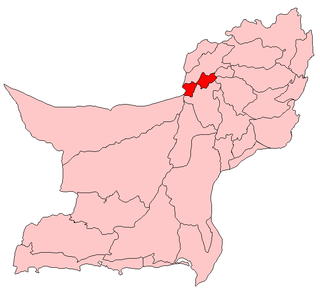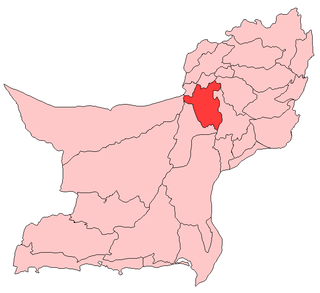
Quetta is a district in the north-west of Balochistan province of Pakistan. It is part of Quetta Division. The district is famous for its agriculture produce, most notably fruit orchards but also including apples and grapes. The Hanna Valley is an area where almonds are grown. The population counted in the 1998 census was 760,000, while in 2010 it was estimated at 1,235,000.

Chaman is the capital of Qilla Abdullah District, Balochistan Province, Pakistan. It is situated just south of the Wesh-Chaman border crossing with the neighbouring Kandahar Province of Afghanistan. After the capital Quetta, Chaman is the second-largest city and tehsil in the Pashtun majority northern part of Balochistan Province.

The Government of Balochistan is based in the largest province of Pakistan in Quetta. The head of the province is the Governor, who is nominated by the President of Pakistan. The chief executive of the Government of Balochistan is the Chief Minister who is elected by the Balochistan Assembly and the administrative boss of the province is the Chief Secretary of Balochistan who is appointed by the Prime Minister of Pakistan.
Wadh is a town in the Khuzdar District of Balochistan, Pakistan. The population of the town was 48.950 according to the 1998 census. Most of the inhabitants of the sub-district belong to the Mengal tribe. The majority of the people in the area are Muslims, with a small Hindu minority.

The N-25 or National Highway 25 is an 813 km national highway in Pakistan which extends along from Karachi in Sindh province to Chaman in Balochistan province. It was previously known as the Regional Cooperation for Development Highway. Also known as killer highway

Hazara Town is a lower- to middle-income area on the western outskirts of Quetta, Pakistan with a population of up to 750,000, of which an estimated two thirds are ethnic Hazaras and the remaining portion are Pashtun and Baloch.

Mariabad is an inner eastern suburb of Quetta, capital of Pakistan's Balochistan province. The majority of the population are Hazara people. This place is the birthplace of many Hazara political, social, military, writers, sports personalities of Quetta city.
Abdul Khaliq Hazara is an ethnic Hazara politician in Hazara Town, Balochistan, Pakistan. He has been the Chairman of Hazara Democratic Party (HDP) since November 2010, and is a member of the Quetta city council.

The 2011 Mastung bus shooting was an armed attack on 20 September 2011 on a bus traveling in Mastung District near the city of Quetta in the Pakistani province of Balochistan. The attack left at least 26 people dead. The victims were Shi'a Muslim pilgrims of the Hazara community, suggesting the attack to have been a targeted killing of sectarian nature. The attack occurred in Luck Pass area near Mastung. The bus was leaving Quetta for Taftan, Balochistan. In addition, 2 others were killed in a follow-up attack on a car on its way to rescue the survivors of the bus attack, which raised the death toll to 28 on that day.

The Pakistan Canoe and Kayak Federation (PCKF) پاکستان کانو و کایاک فدراسیون, founded on 23 March 2009 is the official national governing body for canoeing and kayaking in Pakistan. Its function is to promote sporting activities and events for canoe and kayak paddlers across the country on a national and international level. PCKF is a non-profit organisation, which represents all people and organisations with a genuine interest in canoeing, kayaking and associated sports, helping them to increase the profile of these sports across Pakistan.
On 16 February 2013, at least 110 people were killed and 200 injured after a bomb hidden in a water tank exploded at a market in Hazara Town on the outskirts of Quetta, the capital city of Balochistan, Pakistan. Most of the victims were members of the predominantly Shia Twelver ethnic Hazara community, and authorities expected the death toll to rise due to the large number of serious injuries. The Lashkar-e-Jhangvi group claimed responsibility for the blast, the second major attack against the Shia Hazaras in a month.
Beleli railway station is located in Beleli town, Quetta district of Balochistan province of the Pakistan.
Kuchlak railway station is located in Kuchlak town, Quetta district of Balochistan province of the Pakistan.
Sheikh Mandah railway station is located in Sheikh Mandah town, Quetta district of Balochistan province of the Pakistan.

The 2015 Quetta bus bombing occurred on 19 October 2015 in Quetta a city in Balochistan. The blast killed at least 11 people and another 22 were injured.
Nazim-e-Quetta is the Mayor who head the Quetta Metropolitan Corporation (QMC) which controls the Local Government system of Quetta, Balochistan.

On 23 June 2017, a series of terrorist attacks took place in Pakistan resulting in 96 dead and over 200 wounded. They included a suicide bombing in Quetta targeting policemen, followed by two blasts at a market in Parachinar, and the targeted killing of four policemen in Karachi.

On 12 August 2017, a suicide bombing took place near a Pakistan army truck in Quetta, Balochistan, Pakistan, leaving 15 people dead including 8 soldiers, while injuring 40 others. The Islamic State of Iraq and the Levant – Khorasan Province claimed responsibility for the attack.













